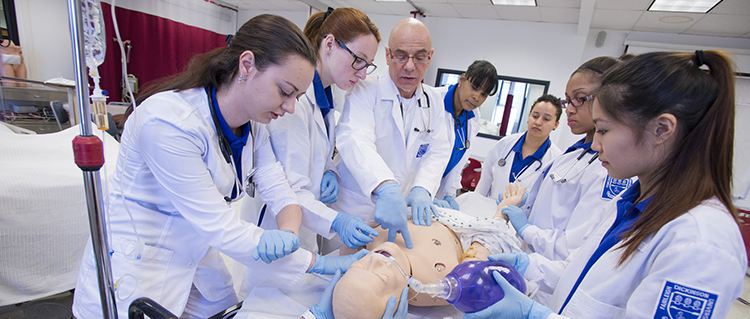Allied Health Technology BS (Respiratory Care concentration)

Respiratory Therapists (“RTs”) are in high demand to care for the increasing number of people with acute and chronic breathing disorders. They treat a range of people and patients, such as premature infants whose lungs are not fully developed, and adults with long COVID or with heart failure. RTs provide supplemental oxygen, manage ventilators, and administer drugs to the lungs. They primarily work in hospitals, but many also start their own companies or move into equipment marketing and sales.
After completing a respiratory therapy degree program, graduates must take the certification exam to become a certified RT or a registered RT. Every state (except Alaska) requires that RTs also obtain a state license. Almost all NY and NJ area hospitals have a need for these providers and are offering starting salaries of > $80,000/year with full benefits for licensed program graduates.
The Bachelor of Science (BS) in Allied Health Technology/Respiratory Care Concentration is a four-year program that provides the graduate with the knowledge, skills, and clinical experience to perform entry-level competencies as a Respiratory Therapist/Respiratory Care Practitioner in a range of health care settings. In addition, the program will provide curricular content including management, quality, finance, research, and advanced clinical practice for the graduate Respiratory Care Practitioner, to assume leadership roles in the health care profession.
We are currently approved by the New Jersey Presidents’ Council (NJPC) to administer this degree program, awaiting Commission on Accreditation of Respiratory Care accreditation (anticipated Summer 2025), and preparing to enroll students for Fall 2025. If you are interested in becoming a RT, please contact Professor Kathy Smith-Wenning (k.smithwenning@fdu.edu) for the most updated information on student enrollment in this track.
Program Goals
In accordance with the Commission on Accreditation of Respiratory Care (CoARC), the primary objectives for this program are:
-
To prepare graduates with demonstrated competence in the cognitive (knowledge), psychomotor (skills), and affective (behavior) learning domains of respiratory care practice as performed by Registered Respiratory Therapists (RRTs)
-
To prepare leaders for the field of respiratory care by including curricular content with objectives related to the acquisition of skills in one or more of the following: management, education, research and advanced clinical practice (which may include an area of clinical specialization).
Admission Requirements
Graduates from an accredited high school/secondary school with a record indicating the potential to succeed in college will be considered for admission into this program. This includes:
- Completion of the following high school coursework:
- 4 units (20 credits) in English
- 3 units (15 credits) in Mathematics
- 3 units (15 credits) in Science, including 1 unit (5 credits) Biology w/Lab
- 2 units (10 credits) in Social Studies/History
- High school GPA of 2.7 or higher.
Curriculum
A minimum of 120 credits is required for graduation from the FDU BS in Allied Health Technology degree program.
**Accuplacer reading/writing scores and math assessment scores will determine which reading/writing and math courses first time, first year students will take. Those with reading/writing placement scores below the standards must complete courses in prerequisite skills (e.g., WRIT 1000, WRIT 1001, READ 1000). Those with math placement scores below the standards must complete courses in prerequisite skills (e.g., MATH 0298, MATH 1100). These credits are applied toward free electives or are non-credit-bearing. This requirement applies to all first time, first year students, even if they have been accepted into this program track.
General Education Requirements (43 credits)
- Written & Oral Communication (9 credits)
- Information and Technological Literacy (3 credits)
- MEDT2217 Info Systems and Applications in Health Care
- Ethical Reasoning (3 credits)
- MEDT1130 Bioethics
- Global and Cultural Understanding (6 credits)
- Scientific and Quantitative Analysis (8 credits)
- Social and Behavioral Analysis (6 credits)
- Inquiry in the Arts & Humanities (6 credits)
- Creative & Expressive Arts: Select from GenEd options
- Humanities: Select from GenEd options
- University Core (2 credits)
Allied Health Technology Major Requirements (20 credits)
- MEDT3204 Social Determinants of Health
- MEDT4430 Utilization of Healthcare Research
- STATISTICS: Select either MATH1133 Applied Statistics OR PSYC2210 Psychological Statistics
- MEDT2210 Pathophysiology
- BIOL2204/BIOL2224 Anatomy and Physiology II + Lab
- CHEMISTRY Foundation: CHEM1107/CHEM1117 Chemistry for Health Sciences + Lab
Allied Health Technology – Respiratory Care Concentration (54 credits)
- BIOL2125/BIOL2126 Microbiology for Health Sciences + Lab
- MEDT4302 Health Care Law and Policy
- MEDT4308 Management Principles for Healthcare
- RESP 1001 Foundations of Respiratory Care
- RESP 1011 Foundations of Respiratory Care Lab
- RESP 1041 Core Concepts in Respiratory Care
- RESP 1021 Cardiopulmonary Pharmacology
- RESP 1031 Cardiopulmonary A&P
- RESP 1201 Clinical Experience I
- RESP 2001 Cardiopulmonary Pathophysiology
- RESP 2051 Cardiopulmonary Evaluation
- RESP 2011 Mechanical Ventilation I
- RESP 2021 Mechanical Ventilation Lab I
- RESP 2120 Clinical Experience II
- RESP 2061 Neonatal/Pediatric Respiratory Care
- RESP 2071 Neonatal/Pediatric Lab
- RESP 2081 Respiratory Care in Alternate Care Sites
- RESP 2011 Mechanical Ventilation II
- RESP 2021 Mechanical Ventilation Lab II
- RESP 2120 Clinical Experience III
- RESP 2111 Special Topics in Respiratory Care
- RESP 2120 Clinical Experience IV
- RESP 4001 Application of Advanced Respiratory Care
Elective Requirements (minimum 3 credits)
- Elective in the major (select from MEDT courses)
Effective March 8, 2024, Fairleigh Dickinson University is pending provisional accreditation by the Commission on Accreditation for Respiratory Care (CoARC) for a respiratory care program.